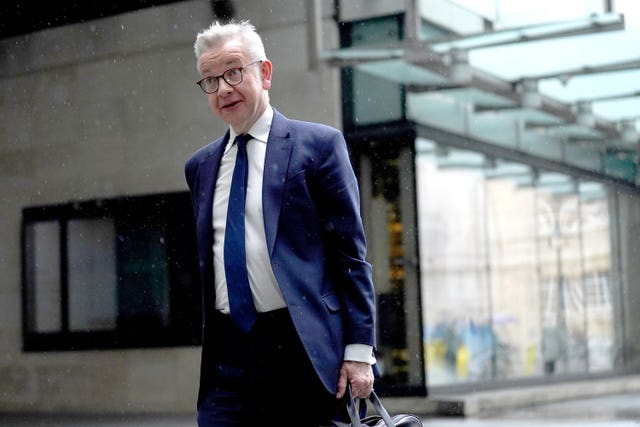The sale of laughing gas to the public will be banned as part of a wider crackdown on anti-social behaviour, a Cabinet minister has confirmed.
Levelling Up Secretary Michael Gove said the “scourge” of nitrous oxide is turning public spaces into “drug-taking arenas” and is helping fuel anti-social behaviour that ministers are determined to stamp out.
The ban comes despite an assessment by the independent Advisory Council on the Misuse of Drugs (ACMD) concluding it would be disproportionate to bring in an outright ban given the level of harm associated with nitrous oxide.
But Mr Gove said he agrees with a view pushed by Prime Minister Rishi Sunak and Home Secretary Suella Braverman that tougher action is required.
Mr Sunak is due to outline a series of hard-hitting measures on Monday designed to clamp down on low-level crime, with plans for offenders slapped with community orders to be cleaning up their own graffiti or vandalism within 48 hours.
Downing Street said the plans will include perpetrators wearing jumpsuits or hi-vis jackets while they carry out punishments, which could include washing police cars or carrying out unpaid work in shops.
Announcing the laughing gas ban, Mr Gove told Sky News’ Sophy Ridge On Sunday programme: “I think any of us who have had the opportunity to walk through our parks in our major cities will have seen these little canisters, these silver canisters which are examples of people not only despoiling public spaces but also people taking a drug which can have a psychological and neurological affect and one that contributes to anti-social behaviour overall.”
He said ministers have not yet decided at what drug classification level laughing gas would be set, only that the Government wants sales “restricted for its appropriate purpose”.

Nitrous oxide is included as an anaesthetic in medical and dental contexts and as a gas for whipped cream.
Mr Gove added: “We can’t have a situation, we mustn’t have a situation where our parks, our public spaces become drug-taking arenas.
“And that is why we need to crack down on new manifestations of drug-taking and these laughing gas canisters are an increasing scourge.”
The senior Conservative minister denied that his defence of the Government’s tougher laughing gas rules could be seen as hypocritical given he has previously admitted to taking the Class A drug cocaine.
The former journalist said he has learned through his own experience that it is a “mistake” to “regard drug-taking as somehow acceptable”.
Current legislation bans the knowing or reckless supply of nitrous oxide for inhalation, with dealers facing up to seven years in jail.
But there have been calls for a ban on all direct consumer sales.
The drug is typically released into balloons from small silver canisters and then inhaled.
Prolonged use can cause vitamin B12 deficiency, anaemia and nerve damage. Doctors previously warned that using laughing gas could lead to spinal injuries.

According to the Office for National Statistics, there were 36 deaths in Great Britain associated with nitrous oxide between 2001 and 2016.
The Prime Minister addressed the issue in his New Year speech, highlighting the blight of discarded “nitrous oxide canisters in children’s playgrounds”.
Mr Sunak is expected to announce the trial in 10 areas of a concept called immediate justice, with the aim of rolling it out across England and Wales next year.
The plan is set to include new funding for Police and Crime Commissioners (PCCs) to ensure those responsible for offences that blight communities are punished as soon as possible.
Mr Gove said it will be backed with £160 million of new funding as well as increased police presence in “hotspot areas where crime is a particular problem”.
He revealed that the proposals will also include increased drug testing for those caught regularly engaging in crime and anti-social activity.
Along with clean-up schemes for offenders, the Mail On Sunday reported that Mr Sunak’s anti-social behaviour crackdown is set to include doubling on-the-spot fines from £400 to £1,000 for those caught fly-tipping.
Those littering or spraying graffiti could be hit with £500 fines, rising from the current £150 maximum, the newspaper said.
Labour said it “wants to see” tougher rules applied on laughing gas.
Shadow culture secretary Lucy Powell told Sophy Ridge: “I think we want to see it banned as well because I think it does cause a huge amount of littering, of disruption and of anti-social behaviour challenges as well.”
But Ms Powell said the Government’s anti-social behaviour plan “amounts to nothing”.




Why are you making commenting on The National only available to subscribers?
We know there are thousands of National readers who want to debate, argue and go back and forth in the comments section of our stories. We’ve got the most informed readers in Scotland, asking each other the big questions about the future of our country.
Unfortunately, though, these important debates are being spoiled by a vocal minority of trolls who aren’t really interested in the issues, try to derail the conversations, register under fake names, and post vile abuse.
So that’s why we’ve decided to make the ability to comment only available to our paying subscribers. That way, all the trolls who post abuse on our website will have to pay if they want to join the debate – and risk a permanent ban from the account that they subscribe with.
The conversation will go back to what it should be about – people who care passionately about the issues, but disagree constructively on what we should do about them. Let’s get that debate started!
Callum Baird, Editor of The National
Comments: Our rules
We want our comments to be a lively and valuable part of our community - a place where readers can debate and engage with the most important local issues. The ability to comment on our stories is a privilege, not a right, however, and that privilege may be withdrawn if it is abused or misused.
Please report any comments that break our rules.
Read the rules hereLast Updated:
Report this comment Cancel